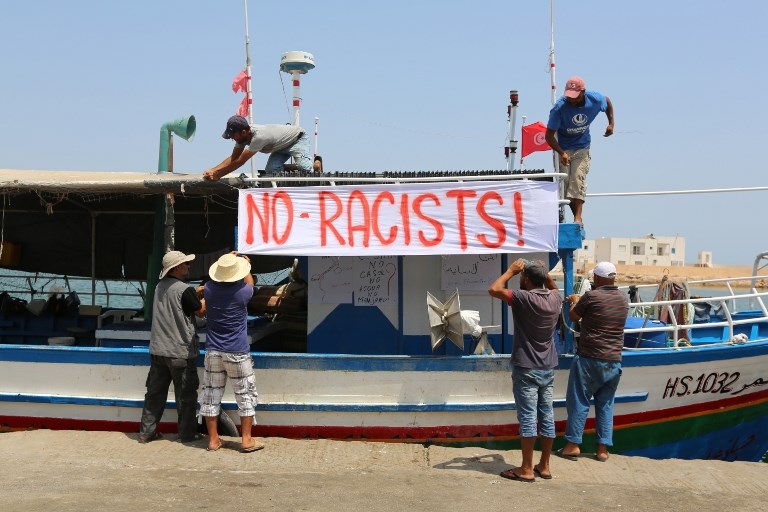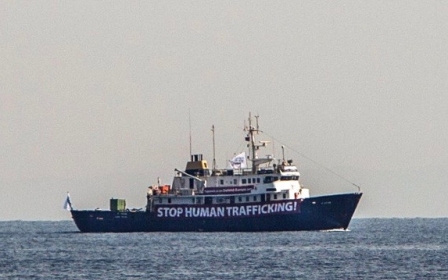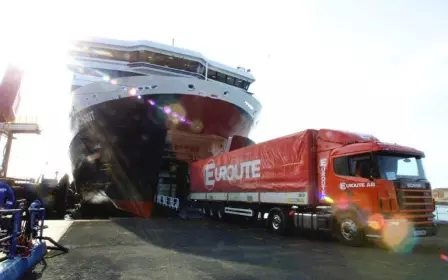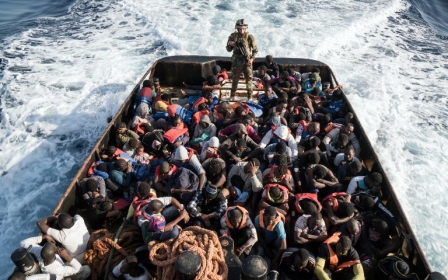Tunisian fishermen stall 'racist' anti-migrant ship's progress

Fishermen at a Tunisian port on Sunday prevented a ship carrying far-right anti-immigration activists from docking, dealing a fresh blow to a controversial mission aimed at disrupting the flow of migrant boats from north Africa to Europe.
Faced with the prospect of being blocked by the fishermen in Zarzis, the ship, the C-Star, moved up the Tunisian coast, and was expected by opponents tracking its path to try to land at either Sfax or Gabes on Monday.
Chartered by extremist group "Generation Identity," the C-Star passed through waters off Libya on Saturday.
It briefly tailed the Aquarius, operated by French group SOS Mediterranee, one of several NGO boats conducting search and rescue operations in an area notorious for deadly migrant boat sinkings.
Having left Cyprus on 1 August, the 40-metre C-Star needs to land in Tunisia for supplies, but appeared to have been caught off guard by the strength of opposition among local fishermen, as well as rights groups.
"If they come here we'll close the refuelling channel," Chamseddine Bourassine, the head of the local fishermen's organisation, told AFP.
"It is the least we can do given what is happening out in the Mediterranean," he added.
"Muslims and Africans are dying."
An official at the port, who asked to remain anonymous, said: "What? Us let in racists here? Never!"
The C-Star headed straight from Cyprus to Libyan waters after being discouraged from attempting to dock en route in Greece and Sicily, with authorities concerned about the prospect of protests.
The self-styled "Defend Europe" mission has not got off to the best of starts.
Their boat was held up for a week in the Suez Canal by Egyptian authorities looking for weapons.
Then, after it landed in the Cypriot port of Famagusta last month, several of its crew jumped ship and asked for asylum in Europe - exactly the kind of thing the mission was set up to prevent.
The C-Star crew say their main goal is to expose collaboration between NGO rescue ships and the traffickers who launch boats from Libya packed with migrants.
Humanitarian groups say Generation Identity is engaged in a publicity stunt and that any attempt to turn migrant boats back to Libya would be potentially very dangerous and illegal under international law.
Defend Europe are part of the young, media-savvy Identitarian movement that says it wants to preserve Europe’s identity and calls for an end to immigration and multiculturalism, HuffPost UK said.
Rather than saving the lives of desperate migrants setting sail from war-torn Libya, the group sees NGOs as enabling people-traffickers by “acting as a taxi service,” HuffPost UK said.
Thorsten Schmidt, a spokesperson for Defend Europe, told HuffPost UK: “Of course by now there is no definite proof of direct collaboration between NGOs and people-traffickers and but this [mission] is deemed necessary because the business of human traffickers is based on the fact that they expect an NGO boat to be waiting for those migrants.
“This means when the human-traffickers are expecting the NGO boat to be there, even more migrants will come.”
While the group claims it will simply observe and, if necessary, come to the rescue of any vessel in distress including those carrying migrants, a number of individuals and groups have expressed concerns to HuffPost UK that they will endanger lives by trying to disrupt search and rescue missions.
Since the start of 2014, about 600,000 people from Africa, the Middle East and South Asia have been rescued from traffickers' boats and taken to Italy.
More than 10,000 have died en route and serial sinkings have resulted in privately funded or charity-run boats joining a multinational search and rescue operation coordinated by Italy's coastguard.
NGO boats have rescued about one-third of the almost 100,000 people picked up this year, but their relations with Italy have become strained as pressure to stem the flow of migrants has mounted.
Critics say the NGOs make it too easy for the traffickers to guarantee would-be migrants safe passage to Europe, allegedly fuelling the lucrative trade.
Italian authorities last week impounded one NGO boat, the Luventa, which is operated by German association Jugend Rettet.
They accused its crew of being in direct contact with traffickers to organise pick-ups of boatloads of migrants from locations very close to the Libyan coast.
On Sunday, the Aquarius was on hand to help as an Italian coastguard patrol boat rescued about 100 people from a distressed dinghy.
The number of such rescues in international waters has fallen sharply over the last five weeks to under half the level of the same period last year.
Italian officials are cautiously optimistic that this reflects a breakthrough in their efforts to strengthen the Libyan coastguard's capacity to combat traffickers.
The Libyan navy told AFP that the coastguard, which has received training and new equipment from Rome, had intercepted six trafficker boats carrying a total of 1,015 people since Thursday.
Rights organisations have voiced concern over the focus on sending boats back to Libya, where migrants who fail to get to Europe often end up in detention in squalid camps where they risk torture, sexual violence and forced labour.
Italian officials defend the strategy as the only way to end a humanitarian crisis that is threatening to overwhelm the country's asylum system.
The crisis has also caused strains in Rome's relations with its EU neighbours, who have blocked migrants landing in Italy from travelling further north.
Middle East Eye propose une couverture et une analyse indépendantes et incomparables du Moyen-Orient, de l’Afrique du Nord et d’autres régions du monde. Pour en savoir plus sur la reprise de ce contenu et les frais qui s’appliquent, veuillez remplir ce formulaire [en anglais]. Pour en savoir plus sur MEE, cliquez ici [en anglais].




